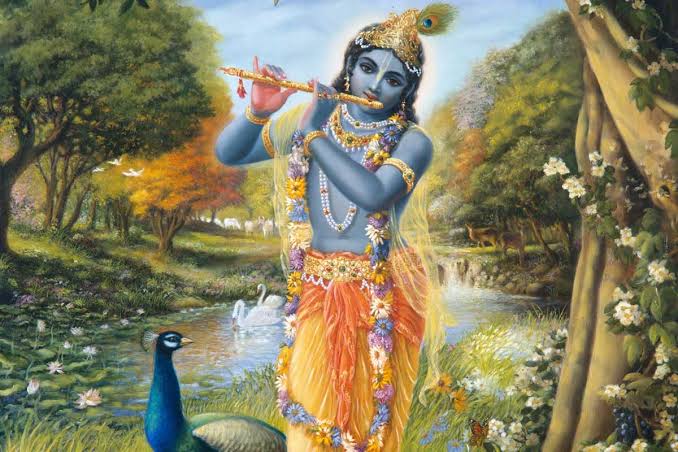An offering to HH Kadamba Kanana Swami
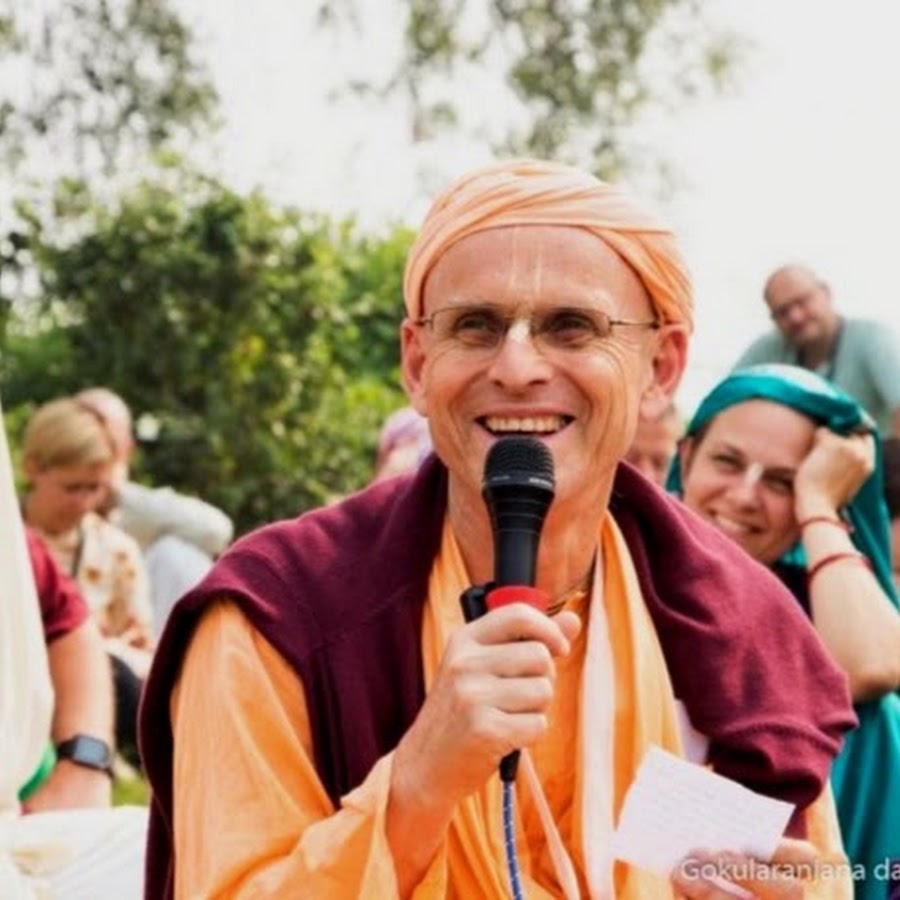
Oh Krishna, the Lord of love and compassion,
We offer this prayer for Sripada Kadamba Kanana Swami,
Who left his body in Vrindavan, in an exemplary way,
A shining example of devotion and surrender, we can say.
He was a stalwart preacher in ISKCON,
A pure Vaishnava, a loving spiritual master,
A kirtan leader, a hands-on manager,
His energy and positivity were like a divine elixir.
He helped thousands of devotees far and wide,
Guiding them on the path of bhakti with pride,
Spreading your message of love and devotion,
Maharaj was a true spiritual inspiration.
Though he has left his mortal body,
His spirit lives on in the hearts of many,
May he find eternal bliss in your divine abode,
And continue to inspire us on the bhakti road.
We will miss his divine association,
His wisdom, his guidance, his inspiration,
But we take solace in the fact,
That he is now with you, Oh Krishna, where he belongs in fact.
Oh Krishna, please bless us with your grace,
That we may follow in the footsteps of HH Kadamba Kanana Swami,
Serving you with all our hearts, in every place,
And attain Your eternal abode, where we will all be together again.
All glories to HH Kadamba Kanana swami
All glories to Srila Prabhupada.
Your Servant,
Giriraj dasa
Matchless gift
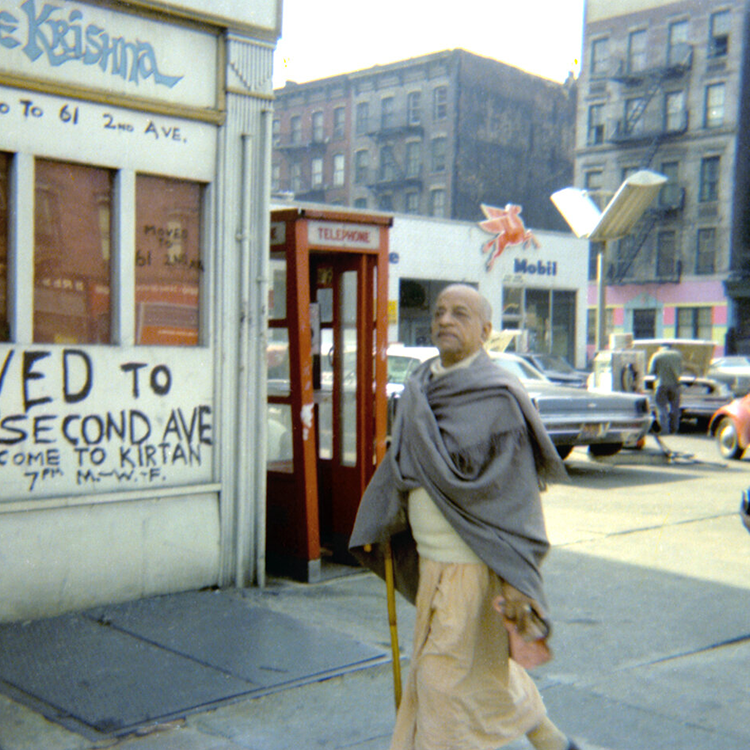
Hare Krishna,
Happy Rath Yatra festival!
Today is a special day when the world received a matchless gift! On this date, 1st July 1966, Srila Prabhupada entered the new storefront at 26, 2nd Avenue in New York, USA. It was the beginning of the unfolding of Sri Caitanya Mahaprabhu’s plan to plant the seed of Krishna consciousness all over the world. Srila Prabhupada immediately started conducting regular classes from this storefront and within two weeks he incorporated ISKCON on 13th July 1966. From this small storefront, Srila Prabhupada launched the worldwide Hare Krishna movement.
Below is the excerpt from the diary of Srila Prabhupada on 1st July 1966-
Friday 1 July
Chaturdasi: Sunrise 4/35 Sunset 7/32 Moonsets 4.07
Today I entered the new house at 26 Second Avenue rear portion Room #B1. For my purpose it all good. I do not why Krishna is trying to establish me in New York. I am his servant’s servant and therefore let His desire be fulfilled through my agency.
The Landlord Mr. Gardiner is pukka landlord. He knows how to increase the rent. But I am not sorry. For two months namely July and August I will have to pay at 62 and odds whereas from September 1st I will have to pay $71 and odds. Let me see how Krishna arranges the things.
In the evening there was meeting in the New Store. There was about eight men Collection $5.50. Book Collection 4.00
The whole day I waited for Con Edison but they did not
Telephone duly installed The New Number 674-7428
Expenditure (?) .50 c

The journey to the Matchless gift store
Mr. Gardiner took a week to paint the apartment. Meanwhile, Mike arranged for the electricity and water to be turned on and had a phone installed, and he and Carl raised the first month’s rent among their friends. When everything was ready, Mike gave Prabhupāda a call at Carl’s.
Now it was time to move the Swami into his new place. A few friends who were on hand accompanied the Swami over to the Bowery loft. Maybe they weren’t prepared to become his surrendered disciples, but contributing toward the first month’s rent and volunteering a few hours of work to help set up his place were exactly the kinds of things they could do very willingly.
At the loft, they all gathered up portions of the Swami’s belongings, and then they started out on foot up Bowery. It was like a safari, a caravan of half a dozen men loaded with Prabhupāda’s things. Michael carried the heavy Roberts reel-to-reel, and even the Swami carried two suitcases. They did everything so quickly that it wasn’t until they were well on their way and Mike’s arm began to ache that he realized, “Why didn’t we bring a car?”
It was the end of June, and a hazy summer sun poured its heat down into the Bowery jungle. Starting and stopping, the strange safari, stretching for over a block, slowly trekked along. Prabhupāda struggled with his suitcases, past the seemingly unending row of restaurant supply shops and lamp stores between Grand, Broome, and Spring streets. Sometimes he paused and rested, setting his suitcases down. He was finally moving from the Bowery. …
The Swami and his young friends reached the corner of Bowery and Houston, turned right, and proceeded east. Gazing steadily ahead as he walked, Prabhupāda saw the southern end of Second Avenue, one block away. At Second Avenue he would turn left, walk just one block north across First Street, and arrive at his new home. As he passed the IND subway entrance, the storefront came into view – “Matchless Gifts.” He gripped his suitcases and moved ahead.
There was no certainty of what awaited him here. But already there had been good signs that these American young people, mad though they sometimes were, could actually take part in Lord Caitanya’s saṅkīrtana movement. Perhaps this new address would be the place where he could actually get a footing with his International Society for Krishna Consciousness.
(Srila Prabhupada Lilamrta, chapter 17)

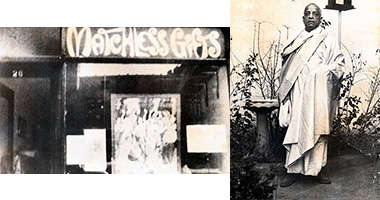
(The unusual hand-painted sign – Matchless Gifts – was a holdover from when the place had been a gift shop. On the right, Srila Prabhupada is standing in the courtyard between the storefront and his apartment.)
All the members and well-wishers of Hare Krishna movement can appreciate the significance of this date when Srila Prabhupada moved into this storefront and gave the world the matchless gift of Krishna consciousness.
All glories to Srila Prabhupada.
Your servant,
Giriraj dasa
Revealing Krishna’s heart

Let us try to get a glimpse into Krishna’s heart today. How lovingly He reciprocates with His devotees and what makes Him obliged to His devotees. There is an underlying sweet mellow in Krishna’s exchange with His devotees. These mellows in Krishna’s heart are revealed to us by the acharyas, they know Krishna’s heart.
Revealing Krishna’s heart
Now, the Lord comes to deliver the devotees (paritrāṇāya sādhūnām), but it is clearly stated in Bhagavad-gītā that a devotee transcends the material qualities (sa guṇān samatītyaitān). A devotee is in a transcendental position because he is no longer under the control of the three material modes of nature — goodness, passion, and ignorance. But if a sādhu is already delivered, being on the transcendental platform, then where is the necessity of delivering him? This question may arise. The Lord comes to deliver the devotee, but the devotee is already delivered. Therefore the word viḍambanam, meaning “bewildering,” is used in this verse because this appears contradictory.
The answer to this contradiction is that a sādhu, a devotee, does not require deliverance, but because he is very much anxious to see the Supreme Lord face to face, Krishna comes not to deliver him from the clutches of matter, from which he has already been delivered, but to satisfy his inner desire. Just as a devotee wants to satisfy the Lord in all respects, the Lord, even more, wants to satisfy the devotee. Such are the exchanges of loving affairs. Even in our ordinary dealings, if we love someone we want to satisfy him or her, and he or she also wants to reciprocate. So if the reciprocation of loving affairs exists in this material world, in what an elevated way must it exist in the spiritual world.
(Teachings of Queen Kunti,12p)
Krishna’s heart is controlled by love
Krishna becomes obliged to the loving spirit of the devotee and not exactly to the service rendered. No one can serve Krishna completely. He is so complete and self-sufficient that He has no need of any service from the devotee. It is the devotee’s attitude of love and affection for Krishna that makes Him obliged.
(Nectar of Devotion, Chapter 22)
How Krishna fulfills the desires of His devotees
In Vṛndāvana there is a place where there was no temple, but a devotee desired, “Let there be a temple and sevā, devotional service.” Therefore, what was once an empty corner has now become a place of pilgrimage. Such are the desires of a devotee.
Who, but only a stone-hearted person like me would not like to surrender to a personality like Krishna, and aspire to become a lover of God.
All glories to Srila Prabhupada.
Your Servant,
Giriraj dasa
Householder mahatma

Hare Krishna, I am sharing excerpts from a lecture where Srila Prabhupada speaks a Householder mahatma. He tells us about the aim, symptoms and determination of such a householder. I pray that his words inspire us to become one.
Can a householder become a mahatma?
Question may be whether a mahātmā can be in the household life or not. That is being described: Yes. In household life also there can be mahātmā. Just like Advaita Mahāprabhu. Caitanya Mahāprabhu even; Nityānanda Mahāprabhu. They were all householders. Caitanya Mahāprabhu, He was a householder. He married twice. His first wife died—He married for the second time. Regular householder, although He left household life very early. He was only twenty-four years old; therefore He had no children. But Nityānanda Prabhu had one child, Vīrabhadra, and Advaita Prabhu had two, three children, of which Acyutānanda was very highly elevated. Similarly, Śrīvāsa Ṭhākura, he had children.
So Caitanya Mahāprabhu does not say that one has to become in the renounced order, of sannyāsī, then he becomes a mahātmā. No. We also do not propagate such idea. At least, I am not doing that. I am creating householder, ideal householder. And my ideas are being fruitful. Here in London I sent six householders, and they are doing nice; sincerely they are working. Therefore I am very much proud of them.
What is the aim of such a householder?
A householder mahātmā has only one aim: how to attain the perfectional stage of love of God. That is the aim. Generally, a householder in the modern civilization, they are simply trying to accumulate money, increase the bank balance and make the society, friendship and love as the aim and object of life, and they have no other business. But a person who is mahātmā, his aim is different. His aim is “How to make my life perfect in Krishna consciousness. How to please Krishna, how to make friendship with Krishna.”
Everyone is seeking some friend. That is a fact. The businessmen or lawyer or politician, everyone is seeking some friend. Without friend… Society, friendship and love, these things are required. But a mahātmā householder, he is seeking actual friendship with Krishna… Because he knows, “If Krishna is my friend…”
Just like Arjuna sought friendship with Krishna; Duryodhana sought friendship with Krishna’s power. Krishna divided Himself. Because it was family warfare between two cousin brothers, and Krishna was also related with both of them by family relationship, so He said, “How can I take part with one and not with the other? Then that will be partiality. So anyway, I divide Myself into two. I am alone, one side, and in which side I shall go, I shall not fight. I shall not touch even a weapon. And the other side, all My soldiers.” Krishna had many soldiers. So Duryodhana thought that “I shall take Krishna’s soldiers,” and Arjuna thought, “I shall take Krishna only, even He does not fight.” So this is the determination of mahātmās, that they want simply Krishna’s friendship.
…A devotee has got four business: īśvare prīti, love for God, Krishna; friendship with devotees; and kindness to the neophytes; and rejection to the non-devotees. These four principles. A devotee’s only lovable object is Krishna. His only friend is devotee, another devotee.
(Lecture, 17 September 1969, London)
As a struggling householder devotee, mere thought of becoming a householder mahatma may seem very fetched but we can rise to that platform if we have the desire, sincerity and most importantly a will to please Srila Prabhupada. Srila Prabhupada desired that all householder devotees should become ideal householders. He mentioned in the above lecture how he is very proud of such sincere householders. Today we have hundreds of such householder mahatmas in our Krishna conscious society.
We can test ourselves with some checkpoints given by Srila Prabhupada in his above lecture-
- What am I doing in my daily sadhana which is helping me to cultivate friendship with Krishna?
- Do I seek friendship with Krishna as a person or with His power?
- Do I long for friendship with non-devotees?
- Are my best friends devotees?
- Is Krishna my only lovable object?
- Is the only aim of my life to please Krishna and His devotee?
Sounds tough! but it is a sweet struggle, it is adventurous and it is full of reciprocation from Krishna and His pure devotees.
All the best !
All glories to Srila Prabhupada.
Your servant,
Giriraj dasa
Sanctioned by Krishna
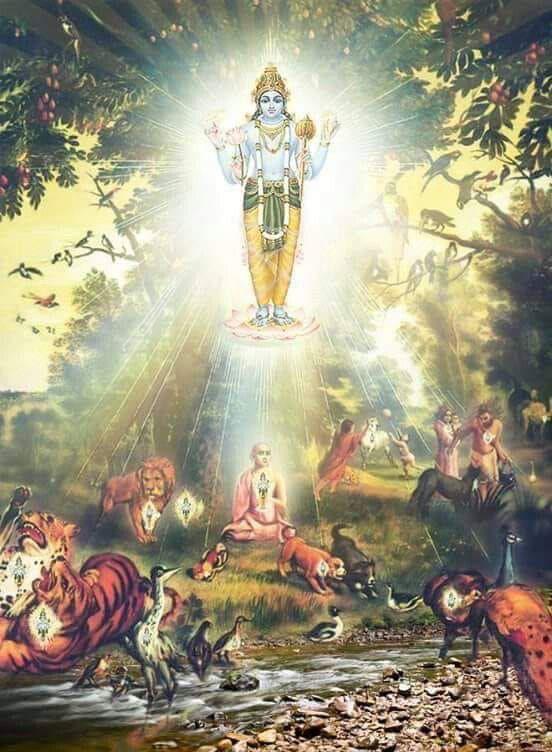
Hare Krishna,
In our daily dealings many times we face circumstances where we have to seek favour from others. Sometimes we get a positive response, sometimes it is negative. Srila Prabhupada shares an amazing insight on how should a devotee see the final result, whether favourable or unfavourable, in a manner that helps us to build our relationship with Krishna.
Srila Prabhupada– So we can ask favor from anyone, but we must know that nobody can favour us unless it is sanctioned by the Supreme Person. We must always know. It is not that one in a superior position can favour me. No, he cannot show favor unless it is sanctioned by the Supreme.
Suppose we approach a rich man to favour us with some contribution or membership fees, but that rich man cannot favour us unless it is sanctioned by Krishna. Krishna is there within him and if he says “You give him this money,” the man will give us. Suppose we request somewhere and he does not favour us. We should not be sorry. We should know that Krishna did not dictate to him that he should donate. He is not so fortunate, therefore Krishna did not dictate as such to him. So there is nothing over which to be sorry. This should be our principle.
(Lecture- 22 March, 1976, Mayapur)
This is a master key that can help aspiring devotees unlock many closed doors-
- Faithfully remembering that everything that is happening is sanctioned by Krishna allows us to live an anxiety-free life.
- Turn a negative experience into a positive ‘spiritual muscle building’ opportunity.
- As we cultivate the habit of naturally feeling dependent on Krishna under all circumstances, it allows devotees to live on Krishna’s mercy, even in this material world.
- Such a culture help devotees to develop a spiritual vision where we can see Krishna’s hand in all the happenings in our life, even in the so-called material dealings.
We can apply this principle in multiple situations- while seeking donations, in our dealings with other devotees, in our professional life, etc. Instead of feeling temporarily elated or disheartened, we can practice to become equipoised during life’s ups and downs, see each happening as sanctioned by Krishna, strengthen our relationship with Krishna, thereby allowing us to always remember Krishna and never forget Him.
All glories to Srila Prabhupada.
Your servant,
Giriraj dasa
How to capture Krishna’s beauty in a painting
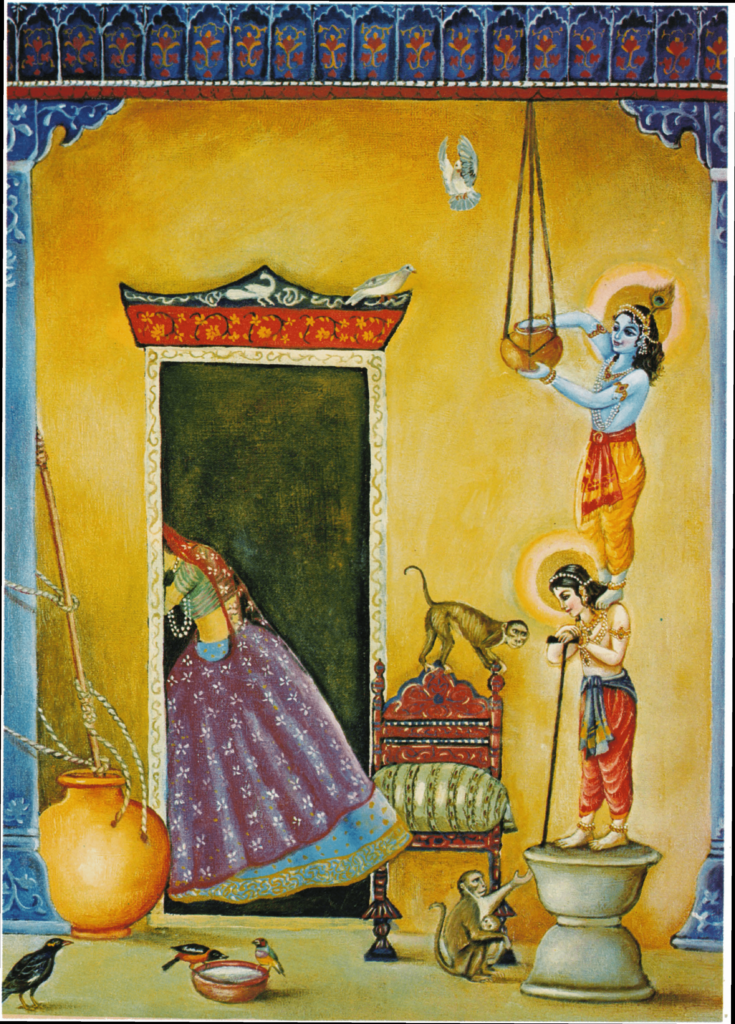
Time
1969, USA
Team
Try to picture this: you are an artist and you‘ve been a devotee for two or maybe three years … or even six months like Bhakta Mark, Muralidhara. There were Jadurani, Bharadwaja came from Montreal, Muralidhara and Devahuti came from L.A.
The Challenge- capture Krishna’s beauty
You are tasked with painting something that is supposed to exceed the greatest works of art ever known to man. You are supposed to paint something that is more beautiful than Raphael or Da Vinci or Rembrandt has ever painted in their lifetimes because you are painting the beauty, the unlimited, infinitely unlimited beauty of God. So what is the beauty of Mona Lisa compared to God … what is anything compared to that? So these poor artists are shuddering: ―How in the world can we accomplish this?
What Prabhupada is giving the world is so great and our skills and our abilities are so small they don‘t match. It is not even close—and then a letter comes and now he wants a painting a day? So, there was a lot of concern, and as they were talking amongst themselves they wrote to Prabhupada that they did not
feel adequate or up to this challenge: ―We think that our skills as artists are not that great, and we think we need to study seriously and go to an art academy. We need to learn the greatest techniques of the greatest art in the world, and maybe then we will be able to do something that might be slightly worthy of what Prabhupada is going to give to the world. A vision of God: how can we paint that? We barely know even how to paint.”
Srila Prabhupada’s vision to capture Krishna’s beauty
Real beauty
Prabhupada explained to them: “Your whole concept of beauty is mundane. Actually, you don‘t even know what real beauty is. There are two parts to understanding real beauty. The first part is that everything in the painting must be authorized and authentic. There can be no imagination, no fabrication, no fanciful imagination like poets and artists of the world who are trying to create something that is beautiful based on what they have seen in the world.”
The second definition Prabhupada gave them is this: “The only way you are going to achieve beauty is through your heart, through bhakti—devotion to God and not through anything mundane. If you don‘t paint with bhakti, I don‘t care what it looks like it will not be accepted”.
How to Capture Krishna’s beauty?
So now we come back to the problem that the artists had and how they proposed that they wanted to go to art school. And Prabhupada had said that was not how they were going to learn how to paint beautifully: “They may teach you how to paint in a mundane way, but that is not what I am looking for. This is how you are going to learn how you are going to paint. You are going to sit in front of your canvas, eight, ten, twelve hours a day. Day after day and the entire time you are going to be painting, you are going to be chanting Hare Krishna Hare Krishna Krishna Krishna Hare Hare Hare Rama Hare Rama Rama Rama Hare Hare. I understand that you feel helpless and totally inadequate and you are in great anxiety that you cannot do this. Yet that is exactly the mood that I want you to be chanting with. I want you to be in so much anxiety, so anxious, in so much desperation that when you call out to Krishna it is from the core of your heart.” It should be the greatest desperation that anyone has ever felt in life. That is how I want you to chant Hare Krishna while your hand is moving, and if you do that day after day, crying to Krishna for help, every single day then you will learn how to be an artist, that is all the training you need.”
( Excerpt from the Book ‘This is my heart’ by HG Ramesvara prabhu)
Rising to the challenge

These are pictures of the ISKCON artists working in Boston in 1970. Bharadraja is painting Lord Caitanya taming the wild beasts in the jungle by His chanting of the holy names. Murali-dhara is touching up a picture of four-headed Lord Brahma in Satyaloka. The devotees hadn’t been painting so long, but they were learning by working….They worked in a rather large area on a second floor with lots of windows. About six painters could work at one time, with lamps clamped to their canvases. They’d listen to Prabhupada’s lectures or bhajans of him singing while they painted, and they considered their lives blissful. Working on the Press in separation from Prabhupada while he toured the world produced intense dedication.
The painters felt dedicated. During this early time I was the manager of the painting department. I didn’t have many duties. I assigned the pictures, managed the personnel and my main job turned out to be how to restrain the devotees from working too much. Painting was a service that gave the painters great enthusiasm, and they worked all day and night, and I had to tear them away from their canvases. They were in a mood of painting in a marathon spirit, and Prabhupada encouraged it. When the paintings were completed and used in the books the originals were put in simple frames and hung in the temples. Prabhupada personally gave instructions by mail as to how exactly the characters should be painted.
(By HH Satsvarupa Das Goswami)
The result- A Miracle
Not bad for no art school. That is the power of the order of the pure devotee because embedded within the order is the potency to carry it out, the empowerment to carry out the order. There is no other way to explain this miracle. Eightyseven paintings in the Krishna book, forty-eight paintings in the Bhagavad-gita and that had to be finished by the end of 1971. And in between they had to paint the second canto, two volumes so seven paintings each. They had to paint for the Nectar of Devotion, and because Prabhupada was introducing art in the books they had to now reprint the first canto, 1st volume and three paintings in those.
There are eighty-seven paintings in the Krishna book, forty-eight paintings in the Bhagavad-gita, twenty-one paintings in the first canto and fourteen paintings in the second canto. And all of this had to be finished by the end of 1971 because then they had to return to the third canto because Prabhupada was already translating the fourth canto. So they painted one hundred eighty paintings in two years, which is unbelievable. By being empowered by Srila Prabhupada, these paintings have a type of bhakti that is impregnated into them by Prabhupada‘s order.
(From the Book ‘This is my heart’ by HG Ramesvara Prabhu)
Scripture confirms-
The form of the Lord is understood by the paramparā system… His description of the bodily features of the Lord is not an imagination. Sometimes we give instructions to our students about the bodily features of the Lord, and they paint Him. Their paintings are not imaginary. The description is given through disciplic succession, just like that given by Nārada Muni, who sees the Lord and describes His bodily features. Therefore such descriptions should be accepted, and if they are painted, that is not imaginative painting.
What Srila Prabhupada revealed on how to capture Krishna’s beauty was so heart-touching that I read it repeatedly and I felt inspired to share it with everyone. The state of our heart needed to capture Krishna’s beauty or Krishna Himself in our heart is now an open secret, the question is do I have the laulyam, the transcendental greed, to want to capture Krishna!
All glories to Srila Prabhupada.
Your servant,
Giriraj dasa
P.S.: The painting on the top is from the first edition of Krishna book.
How to see God face to face?
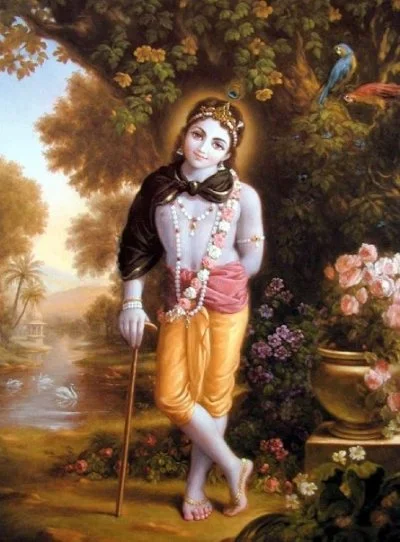
Hare Krishna,
In the last blog we read how there is a Television in our heart. Today we will read how to switch on that television and see God face to face as well in our heart.
Why everyone can not see God face to face?
Lord Śrī Kṛṣṇa’s name, fame, pastimes, etc., cannot be understood by material senses. Only to one who is engaged in pure devotional service under proper guidance is He revealed. In the Brahma-saṁhitā (5.38) it is stated, premāñjana-cchurita-bhakti-vilocanena santaḥ sadaiva hṛdayeṣu vilokayanti: one can see the Supreme Personality of Godhead, Govinda, always within himself and outside himself if one has developed the transcendental loving attitude towards Him. Thus for people in general He is not visible.
(Bg 9.4p)
Demons sometimes declare to a devotee that they cannot accept the existence of God because they cannot see Him. But what the demon does not know is stated by the Lord Himself in Bhagavad-gītā (7.25): nāhaṁ prakāśaḥ sarvasya yogamāyā-samāvṛtaḥ. “I am never manifest to the foolish and unintelligent. For them I am covered by yogamāyā.” The Lord is open to being seen by devotees, but nondevotees cannot see Him.
It’s a mystery!
The impersonalists can imagine or even perceive that the Supreme Brahman is thus all-pervading, and therefore they conclude that there is no possibility of His personal form. Herein lies the mystery of His transcendental knowledge. This mystery is transcendental love of Godhead, and one who is surcharged with such transcendental love of Godhead can without difficulty see the Personality of Godhead in every atom and every movable or immovable object. And at the same time he can see the Personality of Godhead in His own abode, Goloka, enjoying eternal pastimes with His eternal associates, who are also expansions of His transcendental existence. This vision is the real mystery of spiritual knowledge, as stated by the Lord in the beginning (sarahasyaṁ tad-aṅgaṁ ca). This mystery is the most confidential part of the knowledge of the Supreme, and it is impossible for the mental speculators to discover by dint of intellectual gymnastics. The mystery can be revealed through the process recommended by Brahmājī in his Brahma-saṁhitā (5.38) as follows:
premāñjana-cchurita-bhakti-vilocanena
santaḥ sadaiva hṛdayeṣu vilokayanti
yaṁ śyāmasundaram acintya-guṇa-svarūpaṁ
govindam ādi-puruṣaṁ tam ahaṁ bhajāmi
“I worship the original Personality of Godhead, Govinda, whom the pure devotees, their eyes smeared with the ointment of love of Godhead, always observe within their hearts. This Govinda, the original Personality of Godhead, is Śyāmasundara with all transcendental qualities.”
Therefore, although He is present in every atom, the Supreme Personality of Godhead may not be visible to the dry speculators; still the mystery is unfolded before the eyes of the pure devotees because their eyes are anointed with love of Godhead. And this love of Godhead can be attained only by the practice of transcendental loving service of the Lord, and nothing else. The vision of the devotees is not ordinary; it is purified by the process of devotional service. In other words, as the universal elements are both within and without, similarly the Lord’s name, form, quality, pastimes, entourage, etc., as they are described in the revealed scriptures or as performed in the Vaikuṇṭhalokas, far, far beyond the material cosmic manifestation, are factually being televised in the heart of the devotee.
Only by the practice of bhakti-yoga can one achieve the favor of the Supreme Personality of Godhead and see Him face to face (premāñjana-cchurita-bhakti-vilocanena santaḥ sadaiva hṛdayeṣu vilokayanti). One cannot see the Lord by other methods, such as karma, jñāna or yoga. Under the direction of the spiritual master, one must cultivate bhakti-yoga (śravaṇaṁ kīrtanaṁ viṣṇoḥ smaraṇaṁ pāda-sevanam). Then, even within this material world, although the Lord is not visible, a devotee can see Him. This is confirmed in Bhagavad-gītā (bhaktyā mām abhijānāti yāvān yaś cāsmi tattvataḥ and in Śrīmad-Bhāgavatam (bhaktyāham ekayā grāhyaḥ). Thus by devotional service one can achieve the favor of the Supreme Personality of Godhead, although He is not visible or understandable to materialistic persons.
The Lover and the beloved!
Now who can think of Kṛṣṇa always within himself? That is also very easy to understand. If you love somebody, then you can think of him always within yourself. Otherwise it is not possible. If you love somebody, then naturally you’ll think of him always. That is described in the Brahma-saṁhitā: Premāñjana-cchurita-bhakti-vilocanena. One who has developed love of God, or Kṛṣṇa… When I speak of Kṛṣṇa, you should understand “God.” …. Another name of Kṛṣṇa is Śyāmasundara. He is blackish like the cloud, but very beautiful; therefore His name is Śyāmasundara. So in this verse of Brahma-saṁhitā it is said that the santaḥ, saintly person, who has developed love for Śyāmasundara, Kṛṣṇa… Premāñjana-cchurita-bhakti-vilocanena santaḥ sadaiva. Sadaiva means always, constantly. Santaḥ sadaiva hṛdayeṣu. Hṛdayeṣu means within the heart. Actually, when one comes to the point of samādhi in yoga system, he thinks of Viṣṇu form of the Lord within the heart without any stopping.
(Lecture- Gainesville, July 29, 1971)
Just like both lover and beloved. Say one boy, another girl. So they are in love. So both of them think of both of them always. “When we shall meet again, when we shall meet again?” So similarly, man-manā bhava mad-bhaktaḥ. You can become a devotee of Kṛṣṇa, you can think of Kṛṣṇa always, provided you have developed love for Kṛṣṇa. Premāñjana-cchurita-bhakti-vilocanena. By bhakti, you can develop your love for Kṛṣṇa. That is required.
(Lecture, London, August 31, 1973)
You follow Kṛṣṇa’s instruction, and He will be present. He is present; simply we have to purify our eyes and senses to understand Him. That is required. Premāñjana-cchurita-bhakti-vilocanena santaḥ sadaiva hṛdayeṣu. Suppose you have a beloved friend. As soon as you hear telephone call, “Who is it?” “I am this.” “Oh.” You immediately see him. Does it not? Immediately, by the sound. Why? Because you are known to him, you are in love with him. Similarly, in this way, if you develop your dormant love of Kṛṣṇa, you’ll see Kṛṣṇa in every moment.
(Lecture, Bombay, April 1, 1971)
Examples-
Just like Caitanya Mahāprabhu, when he visited Jagannātha temple, He was very anxious to see the Deity, Jagannātha temple. And as soon as He entered the Jagannātha temple, immediately He fainted, “Oh, here is My Lord.” And others are seeing, “What is this foolish man? Here is a wooden form of Jagannātha and this man has fainted.” But that is the difference between this man and you. Unless you develop your devotional attitude, you cannot see God. Bhaktyā mām abhijānāti yāvān yaś cāsmi tattvataḥ
(Lecture, Bombay, October 9, 1973)
A devotee who has developed a genuine love for Kṛṣṇa can always see Him everywhere, whereas a demon, not having a clear understanding of the Supreme Lord, cannot see Him. When Hiraṇyakaśipu was threatening to kill Prahlāda Mahārāja, Prahlāda certainly saw the column standing before him and his father, and he saw that the Lord was present in the pillar to encourage him not to fear his demoniac father’s words. The Lord was present to protect him. Hiraṇyakaśipu marked Prahlāda’s observation and asked him, “Where is your God?” Prahlāda Mahārāja replied, “He is everywhere.” Then Hiraṇyakaśipu asked, “Why is He not in this pillar before me?” Thus in all circumstances the devotee can always see the Supreme Lord, whereas the nondevotee cannot.
In the end..
So everything depends on me. I can see God. Just like I am seeing you face to face, you are seeing me face to face, similarly, you can see Kṛṣṇa face to face. Just like Arjuna saw face to face. Why? Because the relationship was so nice that they were in friendly relation. So seeing of God is not very difficult. Simply we have to acquire that qualification.
(Lecture New York, July 27, 1966)
I hope this helps us feel inspired to aspire to see God face to face.
Your servant,
Giriraj dasa
There is a Television in our heart!
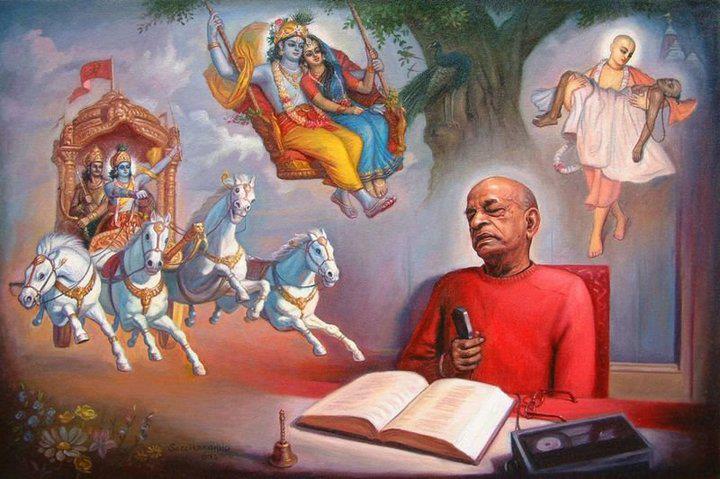
Hare Krishna,
I am sharing below the transcript of a lecture by Srila Prabhupada where he mentions how anyone can see God! He reveals that we have Television in our heart!
Sila Prabhupada: So we are worshiping Govindam, the Supreme Personality of Godhead, the original person. So this sound, govindam adi-puruṣaṁ tam ahaṁ bhajāmi, is reaching Him. He is hearing. You cannot say that He is not hearing. Can you say? No. Especially in this scientific age, when television, radio messages are broadcast thousands and thousands of miles away, and you can hear…. Why Kṛṣṇa cannot hear your prayer, sincere prayer? How can you say? Nobody can deny it.
So, premāñjana-cchurita-bhakti-vilocanena santaḥ sadaiva hṛdayeṣu vilokayanti (Bs. 5.38). Just like thousands and thousands miles away you can transfer the television picture or your radio sound, similarly, if you can prepare yourself, then you can see always Govinda. It is not difficult. This is stated in Brahma-saṁhitā, premāñjana-cchurita-bhakti-vilocanena. Simply you have to prepare your eyes, your mind in that way. Here is a television box within your heart. This is the perfection of yoga. It is not you have to purchase one machine or television set. It is there, and God is also there. You can see, you can hear, you can talk, provided you have got the machine. You repair it, that’s all. The repairing process is Kṛṣṇa consciousness. Otherwise, everything is supplied, complete, complete set of machine you have got within you.
And just like for repairing, an expert mechanic required, similarly, you require the help of someone expert. Then you’ll see that your machine is working. It is not difficult to understand. Nobody can say that it is not possible. In the śāstra we hear also. Sādhu śāstra, guru vākya, tinete kariya aikya.
Spiritual realization can be perfected by three parallel process. Sādhu. Sādhu means saintly persons, who are realized souls, sādhu. And śāstra. Śāstra means scriptures, authoritative scriptures, Vedic scriptures, śāstra. Sādhu, śāstra and guru, a spiritual master. Three parallel lines. And if you place your car or vehicle on these three parallel lines, your car will go direct to Kṛṣṇa.
(SP Lecture – October 18, 1968, Seattle)
Please read it 2-3 times and we may get a sense of what Srila Prabhupada is telling us. And it is not just a theory, being an acharya he himself is experiencing it and then sharing the same with us. Let us delve deeper within us and get the Television in our heart repaired!
In the next blog, I will share Srila Prabhupada explaining in detail- how to see Krishna in our heart!
Your Servant,
Giriraj Dasa
p.s. – Below is the short audio clipping of the above lecture.
Sādhu śāstra guru – three parallel lines

Hare Krishna,
As we progress in Krishna Consciousness it is important to check whether our train is going on the right track. And ours is a special train that runs on three parallel tracks- sādhu śāstra and guru!
Why is it important to me?
Narottama dāsa Ṭhākura states that one has to ascertain the right path for his activities by following in the footsteps of great saintly persons and books of knowledge under the guidance of a spiritual master (sādhu-śāstra-guru-vākya). A saintly person is one who follows the Vedic injunctions, which are the orders of the Supreme Personality of Godhead. The word guru refers to one who gives proper direction under the authority of the Vedic injunctions and according to the examples of the lives of great personalities. The best way to mold one’s life is to follow in the footsteps of the authorized personalities.
They act as checks and balances
Sādhu, whose character is spotless, he’s called sādhu. Śāstra means scripture, and guru, guru means spiritual master. They are on the equal level. Why? Because the medium is scripture. Guru is considered to be liberated because he follows the scripture. Sādhu is considered to be honest and saintly because he follows scripture. Sādhu-śāstra-guru-vākya. Nobody can become a sādhu if he does not accept the principles of scripture. Nobody can be accepted as guru, or spiritual master, if he does not follow the principles of scripture. This is the test.
(Lecture – New York, December 26, 1966)
Can we understand it in more detail please!
Spiritual realization can be perfected by three parallel process. Sādhu. Sādhu means saintly persons, who are realized souls, sādhu. And śāstra. Śāstra means scriptures, authoritative scriptures, Vedic scriptures, śāstra. Sādhu, śāstra and guru, a spiritual master. Three parallel lines. And if you place your car or vehicle on these three parallel lines, your car will go direct to Kṛṣṇa. Tinete kariyā aikya.
Just like in the railway line you see two parallel lines. If they are in order, the railway carriages are carried very smoothly to the destination. Here also, there are three parallel lines—sādhu, śāstra, guru: saintly person, association of saintly person, acceptance of bona fide spiritual master, and faith in the scriptures. That’s all. Then your carriage will be going nicely, without any disturbance. Sādhu śāstra guru vākya, cittete kariyā aikya.
So here in the Bhagavad-gītā, the Supreme Personality of Godhead explaining Himself, Kṛṣṇa. So if you say, “How can I believe that Kṛṣṇa said? Somebody has written in the name of Kṛṣṇa that ‘Kṛṣṇa said,’ ‘God said.’ ” No. This is called disciplic succession. You will see in this book, Bhagavad-gītā, Kṛṣṇa, what Kṛṣṇa said, and how Arjuna understood. These things are described there.
And the sādhu, saintly person, beginning from Vyāsadeva, Nārada, down to many ācāryas, Rāmānujācārya, Madhvācārya, Viṣṇu Svāmī, and latest, Lord Caitanya, in this way, they have accepted, “Yes. It is spoken by Kṛṣṇa.” So this is the proof: if saintly persons have accepted. They have not denied. Authorities, they have accepted, “Yes.” This is called sādhu. And because sādhu, saintly persons, have accepted, therefore it is scripture. That is the test. Just like . . . it is common sense affair. If the lawyers accept some book, then it is to be understood that this is law book. You cannot say that “How can I accept this is law?” The evidence is the lawyers are accepting. Medical . . . if the medical practitioners accept, then that is authoritative medical book. Similarly, if saintly persons are accepting Bhagavad-gītā as scripture, you cannot deny it.
So sādhu śāstra: saintly person and scriptures, two things, and with spiritual master, three, three parallel lines, who accept the sādhu and the scripture. Sādhu confirms the scripture and spiritual master accept the scripture. Simple process. So they are not in disagreement. What is spoken in the scripture is accepted by saintly person, and what is spoken in the scripture, the spiritual master explains only that thing. That’s all.
So via media is the scripture. Just like lawyer and the litigants—via media is the law book. Similarly, the spiritual master, the scripture . . . saintly person means who confirms the Vedic injunction, who accepts. And scripture means what is accepted by the saintly person. And spiritual master means who follows the scripture.
So things equal to the same thing are equal to one another. This is axiomatic truth. If you have got hundred dollars, and another man has got hundred dollar, and if I have got hundred dollar, then we are all equal. Similarly, sādhu śāstra guru vākya, when these three parallel lines in agreement, then life is success.
(SP Lecture, 18/10/1968, Seattle)
This the process
When a man comes into good consciousness and accepts a saintly person as a spiritual master, he hears many Vedic instructions in the form of philosophy, stories, narrations about great devotees, and transactions between God and His devotees. In this way a man becomes refreshed in mind, exactly like a person who smears scented sandalwood pulp all over his body and decorates himself with ornaments. These decorations may be compared to knowledge of religion and the self……. One cannot return to Kṛṣṇa consciousness unless he is favored by the instructions of a saintly person. Therefore Śrīla Narottama dāsa Ṭhākura sings, sādhu śāstra guru vākya, cittete kariyā aikya. If we want to become saintly persons, or if we want to return to our original Kṛṣṇa consciousness, we must associate with sādhu (a saintly person), śāstra (authoritative Vedic literature) and guru (a bona fide spiritual master). This is the process.
Srila Prabhupada openened this opportunity for us
So this Kṛṣṇa consciousness movement is giving chance to everyone to hear from the authoritative sources, from the śāstra. Sādhu śāstra guru. These are authorities. So instead of hearing from the unauthorized persons….
(SP Lecture- Bhuvanesvara, January 22, 1977)
Finally, it is upto us…
Vāsudeva is always ready to help us, provided we want to take help from Him. And He, not only internally He is helping, externally also, He’s sending His representative to teach us. And there is śāstra, just like this Śrīmad-Bhāgavatam. Sādhu, śāstra, guru. Guru is there, śāstra is there, saintly persons are there. You take advantage. And the Lord is there within yourself. So why don’t you take? This is intelligence.
(SP Lecture on SB 1.7.7 — Vrndavana, September 6, 1976)
I pray and hope that this compilation was somehow meaningful and inspires us to regularly hear Srila Prabhupada’s lectures and read his books.
All glories to Srila Prabhupada.
Your Servant,
Giriraj dasa

